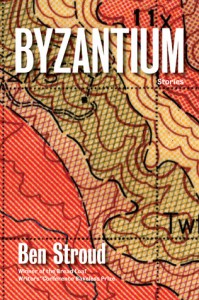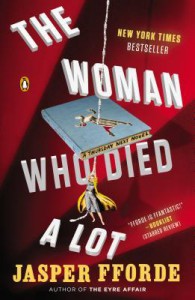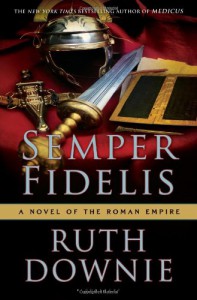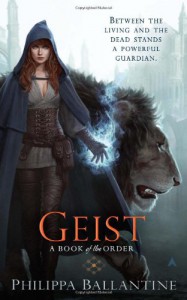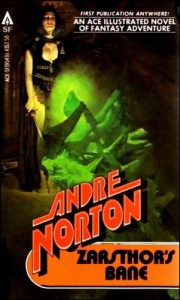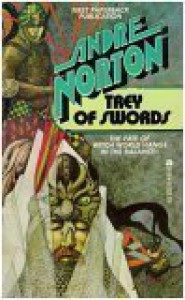
I should begin by saying that I’m going to be grossly unfair and harsh in judging Ian Doescher’s efforts in this book. He comes – at times – to really capturing a Shakespearean flavor and verve but too often appears to believe that he’s channeling the Bard by using “thou” and “prithee” and “anon,” putting verbs at the end of sentences, and stressing past-tense endings (e.g., “banishèd”). That said, this is an enjoyable – if frivolous – diversion, and I would recommend it to the probably-not-quite-as-rare-as-you-might-think Star Wars nerd/Shakespeare geek (or is that “Star Wars geek/Shakespeare nerd”?).
Doescher is at his best when he gives the “rude mechanicals” voice like the stormtroopers who are searching Mos Eisley for the droids or – my favorite – an extended conversation between the two soldiers guarding the Millennium Falcon after its captured by the Death Star.
In the first place, you’ll remember that Imperial troops are combing Mos Eisley for C-3PO and R2-D2 and one comes to a locked door, saying “It’s locked. Let’s move on.” (or words to that effect) That scene has always bothered me – why are these thugs letting a locked door deter them? It’s not as if Palpatine’s New Order includes a Bill of Rights. Doescher, however, provides some context when the trooper justifies his action with logic worthy of Dogberry in “Much Ado About Nothing”:
<blockquote>This door is lock’d. And as my father oft / Hath said, a lockèd door no mischief makes. / So sure am I that, thus, behind this door / Cannot be found the droids for which we search. / And thus may we move on with conscience clear. (III.3, p. 79)</blockquote>
In the second place, the tongueless guards from the movie get a chance to voice their thoughts:
<blockquote>GUARD 1: Oi! Didst thou hear that sound?
GUARD 2: – Pray, hear a sound?
GUARD 1: Aye, truly – I quite clearly heard a sound.
GUARD 2: Think ears, mayhap, play tricks on thee, my friend.
GUARD 1: Nay,nay. Dost thou not think this strange?
GUARD 2: – What strange?
GUARD 1: The droids did flee the ship we have attack’d, / And unto Tatooine have gone by pod. / ‘Tis true, thus far?
GUARD 2: – I cannot claim ‘tis false.
GUARD 1: On Tatooine they have been tracèd first / To Jawas vile and then to humans –
GUARD 2: – Dead.
GUARD 1: Aye, dead they are – our men did see to it. / But follow on: the boy who with them liv’d / Hath fled, we knew not where, till he was seen / At yon Mos Eisley with the pair of droids.
GUARD 2: Aye, aye, ‘twas all in last week’s briefing. Pray, / What more of this? Hast thou aught new to say?
GUARD 1: That boy and droids together disappear’d / The very hour the ship – this ship – did fly. / And now, the ship is here, though empty seems.
GUARD 2: Nay, empty ‘tis! The scanning crew doth work / E’en now.
GUARD 1: – Which bringeth me full circle to / The sound I just have heard. Is’t possible, / My friend, that boy and droids and revels all / Have flown within this ship unto this base / And yet – e’en now – whilst thou and I do speak, / Still hide within the ship?
GUARD 2: – I am amaz’d!
GUARD 1: Aye, verily? Think’st thou I may be right?
GUARD 2: I said thou hast amaz’d me, and ‘tis true. / But never did I say I think thee right – / Thou dost amaze by thy o’eractive thoughts! / A hidden boy! The droids within! A fig! / Avaunt, thou silly guard, be not so thick. / They great imagination hath o’erwrought / They better senses. Thinkest thou thy pow’rs / Of judgment far exceed our Masters true? / May’st thou outwit the great Darth Vader or / The cunning of our Gov’nor Tarkin? Nay! / We are but simple guards, our purpose here / Is plain and to the point: we have been task’d / To watch the ship and follow all commands, / And not to prattle on with airy thoughts.
GUARD 1: Aye, thou hast spoke a well-consider’d word. / Thou are a friend, as I have e’er maintain’d, / And thou hast spoken truth and calm’d me quite. / The rebels hide herein! What vain conceit! / That e’er they should the Death Star enter – ha!
GUARD 2: It warms my heart to see thee so restor’d / And back to thine own merry, native self.
HAN: [within] Pray, my we have thy good assistance here?
GUARD 1: [to Guard 2:] So, let us go together, friend. Good / cheer!
[Guards 1 and 2 enter ship and are killed. Exeunt others.] (IV.1, pp. 102-4)</blockquote>
I also like the fact that Doescher gives the story’s characters moments of introspection that are absent from the movie. Another thing that’s always bothered me about A New Hope is Leia’s lack of reaction to Alderaan’s destruction. In William Shakespeare’s Star Wars, Doescher remedies that with an internal monolog the princess has when she and Luke are sitting despondent in the Falcon after their escape from the Death Star:
<blockquote>His heart breaks for a person, Obi-Wan – / My heart breaks for a people, Alderaan. / My ship crush’d first, and now my planet too: / Did e’er a person know such grief as ours? ….
My Alderaan I’ve known all my life, / And hold it in my heart in high’st esteem. / So had I hop’d to one day make it home, / When this rebellion all is pass’d away. ….
But now I must some other course adopt / And write my life’s own story without them. / My dreams shall not be realiz’d as I wish’d, / Yet may I dream to see some other Fate. ….
Thus shall I strive to hold my hands outstretch’d / And be a calming presence to this man. / So I’ll in his deep mourning act my role / And show him what a comfort friends may be. (V.1, pp. 136-7)</blockquote>
Elsewhere, Doescher is not quite as successful. I’ll give here but one example – a pastiche of Antony’s funeral speech in Julius Caesar and Henry V’s rallying cry in Henry V – that suffers in comparison with the originals:
<blockquote>Friends, rebels, starfighters, lend me your ears. / Wish not we had a single fighter more, / If we are mark’d to die, we are enough / To make our planets proud. But should we win, / We fewer rebels share the greater fame. / We have all sacrific’d unto this cause. / Ye know well the fam’ly I have lost – / My uncle dear and aunt belov’d, aye both, / And then a mentor great, a pow’rful friend. / As massive is the grief I feel for them, / I know full well they’d not have me back down. / The princess hath a planet lost, with friends / And family alike – how great her pain! / And yet as grave as that emotion is, / She knoweth they would have her lead us still. / And ye, ye goodly men and women too, / Ye have all liv’d and lov’d and lost as well, / Your stories are with mine one and the same. / For all of us have known of grief and joy, / And every one has come unto this day / Not so that we may turn our backs and flee, / But that we may a greater courage show, / Both for ourselves and those we left behind. / So let us not wish further ships were here, / And let us not of tiny holes be fear’d – / Why, I have with a T-16 back home / Gone hunting womp rats scarcely larger than / The target we are call’d upon to strike. / And ye, ye brave souls, have your memories / Of your great exploits in your own homelands, / So think on them and let your valor rise, / For with the Force and bravery we win. / O! Great shall be the triumph of that hour / When Empire haughty, vast and powerful / Is fell’d by simple hands of rebels base, / Is shown the might of our good company! / And citizens in Bespin now abed, / Shall think themselves accurs’d they were not here. / For never shall rebellion see a time / More glori’us then our strong attack today! (V.4, pp. 144-5)</blockquote>
Alas and alack, if only I had had this 30 years ago when I was in drama club – I would have loved to have performed some of the scenes found herein!
In the end, I enjoyed reading this book more than I disenjoyed reading it, and come down from the fence on the side of recommending it.
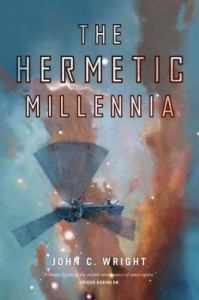

 1
1
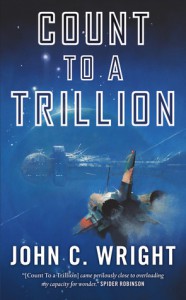
 2
2

